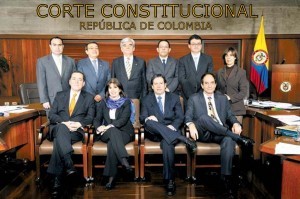EspañolOnce again, the Colombian judiciary is making headlines — not for achievements, but rather for failures. The president of the Constitutional Court, Jorge Pretelt, is taking flak from his peers for allegedly accepting bribes to rule in favor of a certain company.
Days later, the scandal rose to new heights when a former judge of the same court, Nilson Pinilla, accused Pretelt of involvement in paramilitary groups and claimed his own life was in danger.

It never ends. The scandals in Colombia keep coming, and with each new scandal comes more public indignation.
However, as usual, the outrage is confined to the latest scandal itself, and doesn’t focus on the underlying problems at hand.
Let us consider a few pertinent questions. Why do judges choose the cases they review? What incentives do they have in seeking election? What do they gain while in office? What relationships do they have with other branches of government and outside actors?
If one dispassionately analyzes the reprehensible behavior of these judges, it becomes clear that the outcome is a product of perverse incentives created by both formal and informal institutions.
As for the formal, these are the rules that specify the function and scope of judges.
More important, however, are the informal institutions that promulgate these types of damaging practices.
Colombia is a worrying example of what Friedrich Hayek called “constructivist rationalism.” According to the author, this is the belief that human beings can alter, consciously and deliberately, all social realities to achieve their collective goals.
When applied to groups, we see the objectives of the few being imposed on the many. As a result, those who occupy political office are — for some metaphysical reason — perceived as being superior to and more knowledgeable than others.
Hayek, in his book Law, Legislation, and Liberty, spoke about the perilous relationship between constructive rationalism and the legislation. In this area, constructivist rationalism is reflected in the fact that legislative bodies — congresses and parliaments — produce mandates (legislation) based solely upon their own deliberations and competing interests, as demonstrated by the economic school of public choice. They have authority to do so because these bodies, supposedly, represent the interests of the majority.
Hayek warns of this error. These governmental bodies should not create mandates independently, but should instead identify law through a process of social research. When these bodies act under the pretext of constructivist rationalism, they run the risk of creating special privileges, generating unintended consequences, and creating new or worse problems than those they were attempting to solve.
Apparently, this warning did not reach Colombia. In this country, people are under the belief that congressmen are the only ones responsible for producing law. Amazingly, this notion holds even though Constitutional Court judges, whose job it is to ensure that judgments are consistent with legislation, are motivated by their own interests and take advantage of existing mandates.
We have to hope that someday what is happening will pass, namely that the judiciary’s ability to choose which cases they consider relevant will become antiquated. The public must seek to restore fundamental rights as constitutional rights. That is particularly important, because at present the Colombian Constitution treats entitlements such as education, health, housing, and basic income as individual rights.
The law in Colombia has long been applied disproportionately. The legal system didn’t develop in a way that facilitated social cooperation between individuals, nor in a way that maintained harmony between individuals and mitigated the use of violence. Instead, what we know as Colombian law has evolved into an unfortunate tool to create privileges and distribute burdens and benefits according to the values and interests of decision makers.
It should come as no surprise, therefore, that a magistrate without credentials or ethics came to power, abused his position, and took advantage of its lack of limitations and restrictions. These judges act according to their own personal biases — robbing the rights of certain individuals — while defending their own interests.
Perverse incentives. Why aren’t they up for debate?
Translated by Michael Pelzer. Edited by Fergus Hodgson.
 Versión Español
Versión Español












